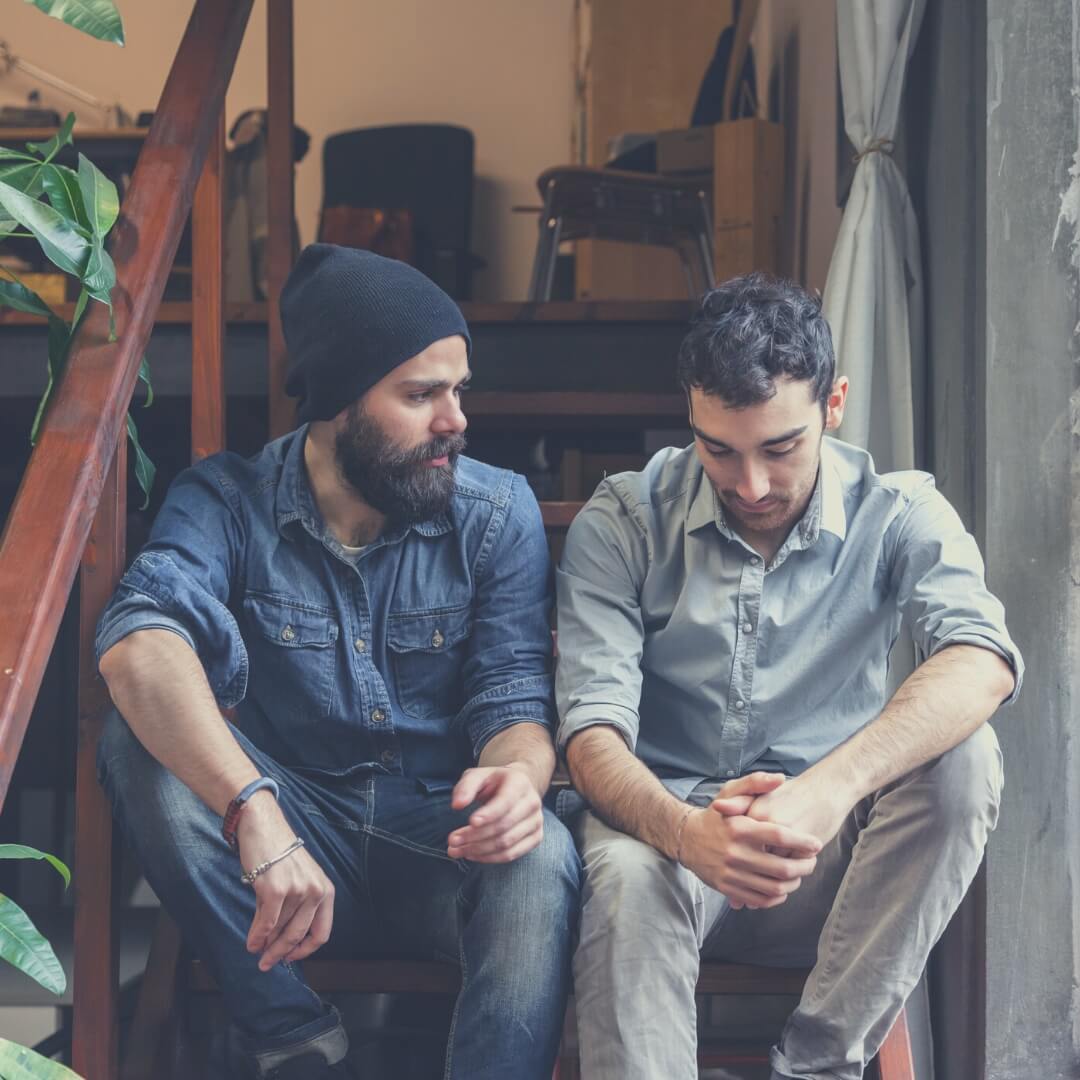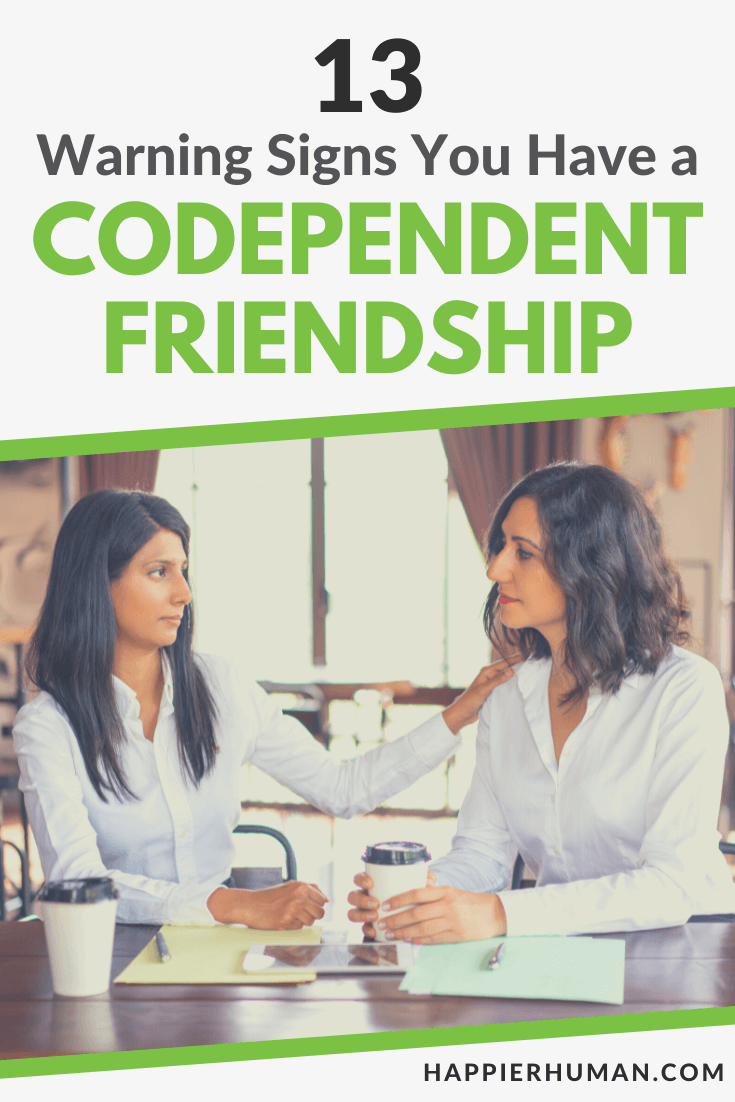From the get-go, you should keep an eye open for signs of a codependent friendship… where one person is the dominant giver and the other is the dominant taker. This means you’ll need to learn how codependency happens, what signs to look for, its toll on mental health and well-being and when to end the relationship.
Lucky for you, we’ll cover all of that here. I’ve also included quick tips on how to deal with friendship codependency and a note on how therapy might help.
True, close, and trusting friendships add a different dimension to living. They provide a unique experience you almost cannot get from your partner or family members. You find common ground and do many exciting things together. The more loving and supportive friends you have, the better. Even having at least one friend to share with and lean on can make your life more meaningful.
However, a high level of closeness doesn’t always equate to a healthy and mutually satisfying friendship. In some cases, it must be managed carefully to stave off a dysfunctional dynamic called “codependency.”
Close friendships are not unlike other close relationships, where people have the tendency of becoming enmeshed – thus running the risk of developing codependency.
What Is Codependency?
According to Mental Health America, codependency is an “emotional and behavioral condition that affects an individual’s ability to have a healthy, mutually satisfying relationship.” Their relationships are characterized as one-sided and emotionally exhausting. The mental condition was initially recognized by researchers studying the relationship dynamics of alcoholics.
The term codependency can now be applied to relationships between partners and friends. Typically, one person requires an excessive amount of emotional, psychological, and/or physical support from the other. The relationship becomes imbalanced and “addictive” with the main “giver” seen as the “enabler” or “codependent.”
The giver is usually someone who is empathetic or has a caretaker or rescuer mentality. They also don’t set out to enable takers or create a codependent friendship. The situation turns out this way when they’re paired with a friend who has a taker or user mentality. What’s more, is that the caretaker and their enmeshed friend often struggle to break the giver caretaker pattern. They feel responsible for meeting the taker’s needs, plus their empathy won’t allow it.
Issues Created by Codependency in Friendships
Even though imbalanced, the enabler friend (usually someone with empathic traits) also benefits from the relationship. For example, they might like people to view them as a “good person” or derive their sense of self-worth from being at the beck and call of the taker friend. These are some reasons why the enabler friend finds it difficult to set healthy boundaries or end the friendship altogether.
Neither party in a codependent friendship benefits in a healthy way. Enabling someone’s needy behaviors does them a disservice. There’s no need for them to take accountability. You’re always swooping down to help or fix things for them. They may not feel motivated to get a job, quit destructive or addictive behaviors, or seek therapy because you rescue them.

If you’re the enabler, you may begin wondering whether your taker friend cares for you at all or is just using you. It’s normal to feel hurt, angry, or resentful, especially when your friend never helps whenever you need any kind of support.
Emotional distress, frustration, compassion fatigue, and mental exhaustion are other problems you may face. And still, your needy friend is never usually there to soothe and reassure you. Know the 17 Warning Signs You Are Being Used by Others.
Alcoholism, substance abuse, emotional distress, helplessness, anxiety, and depression in individuals affected by caregiver burnout have been linked to codependency. Enablers may also resort to gambling, overeating, or having sex with random strangers to cope.
Most Common Causes of Codependency
“Codependency is a learned behavior that can be passed from one generation to another,” according to Psychology Today. Perhaps you grew up in a home seeing your parent going out of their way to help others. They’ll go the extra mile even when they themselves are in need.
You learned and now are imitating those behaviors as an adult. You believe it’s okay to leave yourself undone for the sake of others. Besides family history, the harmful behavior is commonly seen in those with codependency personality traits, such as negative self-talk or a need for approval. Other causes or risk factors include:
Wherever the root cause lies, being too emotionally enmeshed with others prevents you from forming and sustaining healthy, mutually fulfilling relationships. It’s not your job to be a provider, helper, rescuer, financial supporter, or emotional crutch for an adult friend who is capable of fending for themselves. At some point, you’ll have to call it what it is—a mutually unsupportive friendship. You’ll then need to decide if to try and fix or end it altogether.
What Does a Codependent Friendship Look Like? 13 Signs
It might be the first time it dawns upon you that you or someone you love is experiencing codependency. Take a look at the signs before proceeding to decide how to deal with the friendship moving forward.
1. You are your friend’s primary source of emotional support
Friends ask friends for assistance all the time. It’s a normal part of that relationship dynamics. What’s not normal or healthy is a friend persistently relying on you for all their needs. They’re needier than the average person. You’re their target every time they want something, including emotional support and validation.
I had to put an energy-sucking friend on “Do not Disturb” to prevent her from upsetting my day with incessant texting about her breakup. Empathy attracts energy vampires and showing too much empathy can turn a healthy friendship toxic. Knowing the signs of a codependent friendship helps you to address the problem early.
2. You’re always there whenever they need help
Have you noticed you spend a lot of time with a particular friend and drop everything to help them? Day or night, well or ill, you’re there. Perhaps you anticipate their needs. You pass them a facial tissue even before they sneeze. Do you know why?
As someone with a caregiver persona, you feel responsible for meeting their needs. You feel compelled to listen, help them make decisions, lighten their burdens, and care for their overall well-being. Stop caring so much.
Chances are, your friend made you feel guilty for not helping in the past, so you’re out to prove how good of a friend you are. A caring friend won’t guilt-trip you into helping them. Guilt tripping is one of 25 Toxic Personality Traits You Should Watch Out For.
3. You find it hard to say no
Chances are the friendship is codependent if you have trouble asserting yourself or your needs to the taker friend. Difficulty setting personal boundaries is another potential factor. At times when you genuinely want to say no, there’s this lingering sense of guilt inside.
Healthy boundaries in relationships help protect one person from taking advantage of the other. If you are unavailable or don’t feel like helping, it won’t hurt to just say, “No.” By the way, “No” is a complete sentence and enough to establish a limitation. There’s no need to explain why you don’t want to do something.
4. Helping is one-sided
All parties get their needs met in healthy friendships. Help and support flow naturally and there’s a balanced give and take. Things look vastly different in a codependent friendship. Your friend isn’t really interested in offering you help or emotional support when you’re going through a difficult time.
You may not feel appreciated, valued, or respected, which may leave you feeling hurt, sad, or depressed. Despite the negative emotions, you keep giving—for a reason. You may not know this, but giving is essential, as it feeds your self-worth.
5. You put your friend’s needs before your own
Are you featuring way down on the list of people to care for? A lack of self-love and self-compassion are contributing factors to why you prioritize your friend’s needs over yours. You feel obligated to keep them happy. It doesn’t matter if you have to cancel plans or leave your family to go rescue your friend, you’re there on time, all the time.

As you start working on building your self-esteem, you’ll realize that you owe it to yourself to take care of yourself first. In fact, you’ll begin to feel a lot more self-confident once you start setting limits on how much you’re willing to do.
6. You adopt your friend’s mood
I’ve experienced this with a girlfriend in the past. If she was angry or sad I felt the same. If someone hurt her feelings, I immediately felt resentful toward the individual. I always sided with my friend, so she could feel validated. A totally unhealthy situation. As a codependent friend, you also take on a protective role.
Feeling how someone feels when they’re sad, for example, is a sign of empathy. However, if their mood keeps affecting yours, that could be a sign of enmeshment. In other words, your emotional reactions are not separate from theirs and are dictated by how they’re feeling.
7. You get anxious when you’re not in contact
As an enabler, you may worry or get anxious if you don’t hear from your friend for a day or two. An addiction to being needed may cause those negative feelings. The response is similar to people who are addicted to drugs and suffer anxiety or depression if they miss a dose.
Too much distance or a sense of withdrawal from your friend may trigger you to make contact to see if they’re okay. It’s not uncommon to also feel rejected or discarded, as I’ve experienced in a codependent relationship with a narcissist.
8. You frequently feel angry and resentful
Helping a friend is okay. Going beyond the scope of helping to a point where you feel uncomfortable is where the problem lies. No wonder you get so angry, upset, and resentful when you don’t get the same good treatment in return. Feeling angry when your help isn’t effective or your friend does something contrary to your advice is also possible.
One night, I stayed up until 2:00 AM trying to explain to my girlfriend why she should break off an unhealthy romantic relationship. She said she would, only to go out on a date the next day with the same guy she was complaining about. I was livid because I lost hours of sleep providing her with emotional support. I felt she was inconsiderate of my time and helpless towards him.
9. Your friend feels jealous of your other friendships
An enmeshed friend might act jealous if you form any other close relationships or friendships. They kind of think they own you and are threatened by others getting too close. Fear can come from the thought of losing your kindness to someone else.
After all, you’re always at their beckon and call. Who’s going to be there for them if you leave? You yourself might feel jealous seeing someone else get too close to your taker friend. You also don’t want to lose the benefits you’re getting from the relationship.
10. You’re scared to share your feelings
You avoid burdening your friend with your problems. Somehow you think it’s not fair for you to distress them. After all, they have their own problems and needs, right? In other cases, the friend may dominate the interaction, leaving no room for you to talk about your problems or feelings.
You often feel scared to point out the one-sidedness, in fear you may anger your friend or push them away. Not wanting to upset them or cause a threat to the friendship can come from a lack of boundaries and low self-worth. It’s natural to want to keep them close since you actually do need the person too.
11. You feel drained at the end of the interaction
Although they may not be aware of their behavior, your user friend typically comes to offload on you or ask for help. A listening ear to bombard with all their troubles, money, or favors, perhaps. They’re not coming to give anything, just to plug in and suck all of whatever they can out of you.
I’ve taken a what type of empath are you test after recognizing a pattern of always trying to help people out of their problems. I had a particular female friend who called me all hours of the day to vent about her problems and seek my advice. I knew things had turned unhealthy, once I realized I was putting work and chores on hold for her.

She would assault my ears for hours. After showing care and providing validation, my attention-seeking, self-centered friend usually leaves feeling upbeat and energized.
On the other hand, I leave feeling emotionally and mentally exhausted. She used to suck the life out of me. To be fair, I enabled her, so it was my responsibility to break the pattern. I did, and so can you!
12. You feel guilty if you don’t help
You should be able to turn people down without feeling guilty or bad about yourself. Having a caregiver mentality brings on those feelings. Helping people, even going above and beyond, makes you feel important or worthy. Even though a positive feeling is created, it’s not coming from a healthy place.
Obtaining a sense of worth from sacrificing yourself can stem from low self-esteem. You may also believe that you don’t deserve reciprocity. That lack of self-compassion causes you to continue enabling your friend. Your heart is in the right place. However, stop worrying about how others feel if you can’t, don’t, or won’t help.
13. Being needed makes you feel special
Some of what’s happening between you and the needy friend are linked to a deep desire to feel wanted and important. Most of us like to feel we belong whether at home or in our social world.
The question is what’s driving that desire? Someone needing your kindness allows you to self-validate as a kind person, perhaps?
Issues like parental neglect or abandonment could’ve created an emotional void that causes you to look for love, attention, and validation in all the wrong places.
Somewhere in your mind, you might feel self-sacrificing behaviors will fill that void or make others think highly of you. Not only that, you’re benefitting in some way, whether it’s companionship or validation.
Note: These signs are applicable even if you recognize yourself as the ‘taker’ and want to stop being so overly needed.
How to Handle a Codependent Friendship
A codependent friendship involves two people. Regardless of how you look at it, that friendship is a toxic relationship. Helping a friend is okay, but there’s a difference between helping and enabling.
Going beyond the scope of helping to a point where you feel uncomfortable is where the problem lies. No wonder you get so angry, upset, and resentful when you don’t get the same good treatment in return.
Now that you’re aware of what’s really been taking place, you’re empowered to change that dynamic. Your taker friend, on the other hand, might be oblivious to your sacrifices and dedication to the friendship or are naturally unappreciative. Either way, their behavior has taken its toll and something needs to be done.
You could bring your observations to their attention and give them a chance to recognize their failure to be a true friend. If they want to work together on creating a healthy mutually satisfying friendship, then it’s up to you to agree. At the same time, it’s important for you to take accountability for your role in enabling the situation.
Final Thoughts on Identifying a Codependent Friendship
Codependent friendships generally begin on a good note before changing in nature. That said, your focus should turn toward correcting your behaviors and ending codependency. Consider setting healthy boundaries and new rules of engagement that will promote a balanced and healthy friendship.
Your friend may show a willingness to work on their independence or seek professional help. You, too, can benefit from therapy for codependency. You’ll learn the root cause of your helper mentality and how to set healthy boundaries in relationships.
If, however, your attempts to salvage the friendship are met with constant pushback or disinterest in changing the dynamics, then you have every right to detach from it—with love. Find consolation in knowing you’ve tried.
In the end, you’ll leave with a better understanding of the signs of a codependent friendship and steer clear of it in the future. For more on this topic, be sure to check out our article on the 7 Steps to Stop Being Codependent in a Relationship.


